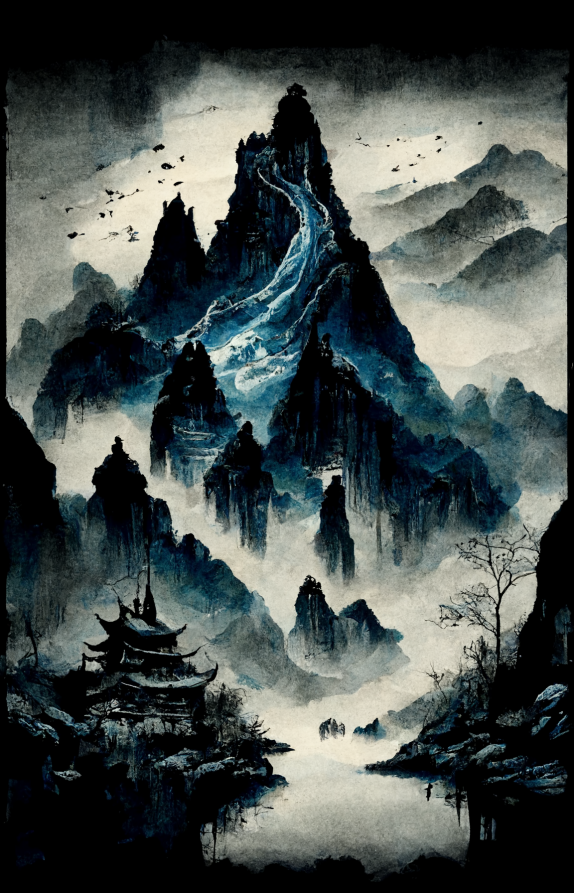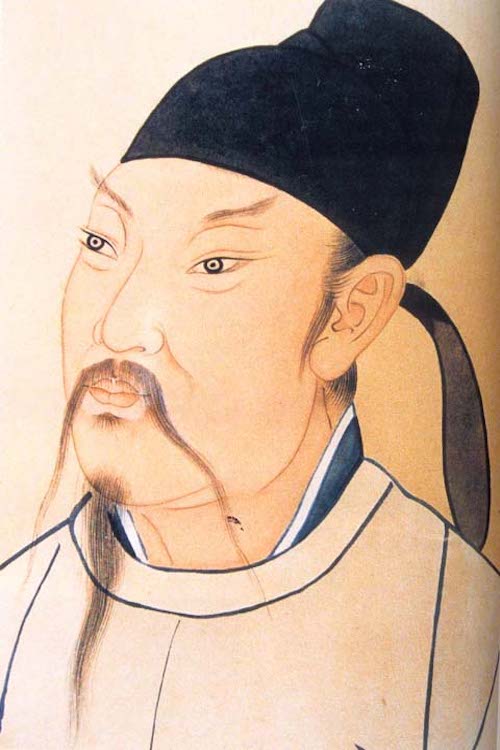
The perilous heights, oh how they loom,
Shu’s rugged realm, a perilous doom.
A king of old reclaimed this land,
Eons ago, in a far-off band.
Forty-eight thousand years have passed,
Till Shu and Qin’s paths, at last.
The Great White Mountains, a bird’s domain,
Trails treacherous, even Emei’s peak is in vain.
Heroic men lost, to landslides and quakes,
Before a plank passage, along cliffs did make.
The Sun God’s carriage, at the highest peak,
The lowest valley, white water, wild and steep.
A canyon, not even yellow storks can cross,
A gorge, not even monkeys and gibbons can toss.
The trail on Green Mud Peak winds and bends,
Nine turns in a hundred steps, rocky and dense.
A hand’s reach from the sky, it takes the breath,
A seat to sit, to calm the heaving chest.
When shall you return from this journey west?
It’s a formidable route, it’s almost a test.
Birds hum glumly, among ancient trees,
Tailing one another, as they encircle with ease.
Cuckoos warble, under the moonlit night,
Filling the uninhabited mountains with plight.
The Sword Pass, steep and soaring high,
One guard could hold off an army nigh.
Garrisoned by bandits, or jackals alike,
Daytime tigers, nighttime pythons to strike.
The Magnificent City, a paradise said,
But never as good as home, in my head.
I turn west, and sigh after sigh,
Shu’s rugged realm, a perilous sky.
People have speculated about the writing background of “The Difficult Road to Shu” since the Tang Dynasty. There are four main theories: A. This poem is about Fang Guan and Du Fu. Jiedu envoy Yan Wu’s murderous hand; B. This poem was written for Tang Xuanzong Li Longji who fled to Shu to avoid the Anshi Rebellion, and advised him to return to Chang’an so as not to be coerced by local warlords in Sichuan. C. This poem was aimed at satirizing the Shu land at that time Chief Zhangchou Jianqiong wanted to take advantage of the risk to separate the regime, and did not listen to the imperial court’s restraint.
This poem was first recorded in “The Collection of Heyue Yingling” compiled by Yin Fan of the Tang Dynasty. Before the compilation of Heyue Heroic Spirit Collection. At that time, the Anshi Rebellion had not yet occurred, Tang Xuanzong lived in Chang’an, and Fang Guan and Du Fu had not yet entered Sichuan. Therefore, A and B are obviously wrong. As for the statement of satirizing Zhangchou Jianqiong, judging from the relevant records in some historical books, there is also no basis. When Zhangchou Jianqiong was in Shu, although he exploited and oppressed the people, he did not dare to rebel against the imperial court. Instead, he blindly flattered the powerful and powerful in order to go to Chang’an to become a Beijing official. Relatively speaking, the last statement is more objective and close to the reality of the work.
It is generally believed that this poem was probably written by Li Bai when he was in Chang’an from 742 to 744 AD (Tianbao Yuanzai to Tianbao Sanzai) to send his friend Wang Yan to Shu, with the purpose of persuading Wang Yan not to stay in Shu. , Return to Chang’an as soon as possible. Avoid the unexpected hands of jealous villains.
This poem can be roughly divided into three parts.
The first part, from “cancong and yufu” to “then the ladder and stone stacks are connected”, mainly writes about the difficulty of opening up the road. From the ancient legends of the founding of Cancong and Yufu, the poet traced back the long history of the isolation and incommunication between Shu and Qin, and pointed out that it was because five heroes paid the price of their lives that they opened up a rugged road among the untouched mountains. Precipitous plank road. Emphasized the hard-won Shu Road.
The second part, from “there are six dragons on the high mark of returning to the sun” to “people who are so far away, come here for nothing”, mainly writes about the difficulties of trekking and climbing. This part can be divided into two layers. The first eight sentences are one layer, emphasizing the highness of the mountain and the ruggedness of the road. For example, the six dragons, yellow cranes, apes and other birds and beasts that are good at flying and climbing are helpless in the face of the Shu Road, so as to reflect how easy it is for people to climb the Shu Road; The exaggerated depiction shows that the Shu Road is so high that it is impassable. The second floor is below “Ask Your Majesty when you will return to the West”, which depicts a series of scenes such as mourning birds, ancient trees, night moon, empty mountains, withered pines, cliffs, turbulence, and waterfalls. Exaggerate the empty and terrifying environment and the bleak and sad atmosphere in the mountains, and lament why your friends would take this risk to enter Sichuan.
The third part, from “Jiange is towering and Cui Wei” to “It’s better to return home early”, from the danger of Jiange’s geographical situation to the dangerous social situation at that time, advises friends not to stay in Shu for a long time, and return to Chang’an as soon as possible. This part can also be divided into two layers. The first five sentences form a layer, using the sentence “One man’s lotus halberd, ten thousand men sway. In a place of great shape, don’t live with bandits and relatives” in Zhang Zai’s “Jiange Inscription” in the Western Jin Dynasty, highlighting the dangers of the Jiange Pass, and the last six sentences are a layer, with poisonous snakes and beasts Killing like hemp implies that the local warlords will endanger the people if they rebel against the danger, and advise friends to leave the danger as soon as possible.
The whole poem is mainly composed of the above three parts. As for the two lines of “The difficulty of the road to Shu, it is difficult to go to the blue sky” that appear three times in the poem, they are the clues connecting the various parts. It makes the whole poem echo from the beginning to the end, round and round, continuous and inseparable.
“The Difficult Road to Shu” is an old title of the Han Yuefu, which belongs to the “Se tune” in “Xianghe Geci”. Volume 40 of Guo Maoqian’s “Yuefu Poetry Collection” quoted “Yuefu Explanations” and said: “”The Difficult Road to Shu” prepares for the obstacles of Tongliang and Yulei (both are the names of Sichuan mountains)”. From Emperor Jianwen of Liang Dynasty to Zhang Wencong in the early Tang Dynasty, many people wrote poems with this title. Although Li Bai’s poem also uses the old Yuefu title to describe the difficult road to Shu, the content is richer and the ideological significance is more positive.
噫吁嚱,危乎高哉!蜀道之難,難於上青天!亦須乎
蠶叢及魚鳧,開國何茫然!
爾來四萬八千歲,不與秦塞通人煙。
西當太白有鳥道,可以橫絕峨眉巔。
地崩山摧壯士死,然後天梯石棧相鉤連。
上有六龍回日之高標,下有衝波逆折之回川。
黃鶴之飛尚不得過,猿猱欲度愁攀援。
青泥何盤盤,百步九折縈巖巒。
捫參歷井仰脅息,以手撫膺坐長嘆。
問君西遊何時還?畏途巉巖不可攀。
但見悲鳥號古木,雄飛雌從繞林間。
又聞子規啼夜月,愁空山。
蜀道之難,難於上青天,使人聽此凋朱顏!
連峯去天不盈尺,枯鬆倒掛倚絕壁。
飛湍瀑流爭喧豗,砯崖轉石萬壑雷。
其險也如此,嗟爾遠道之人胡爲乎來哉!(也若此 一作:也如此)
劍閣崢嶸而崔嵬,一夫當關,萬夫莫開。
所守或匪親,化爲狼與豺。
朝避猛虎,夕避長蛇;磨牙吮血,殺人如麻。
錦城雖雲樂,不如早還家。
蜀道之難,難於上青天,側身西望長諮嗟!

Li Bai (701-762), considered one of China’s greatest poets alongside Du Fu, lived during the Tang Dynasty’s golden age of poetry. Known for his vivid imagery and deep emotion, Li Bai’s work spans about 1,000 poems on themes like nature, friendship, and existential reflections. Celebrated for his spontaneous verse and exploration of Taoist ideals, Li Bai’s poetry also deeply admires the natural world and ancient times, often challenging life’s ordinary constraints. His depiction of China’s landscapes combines natural beauty with personal sentiment. Earning the title ‘Poetry Immortal,’ Li Bai’s influential poetry is globally admired for its artistic and philosophical depth.
Image: MidJourney/DALL-E 2